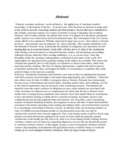| dc.description.abstract | “Forensic veterinary medicine” can be defined as “the applied use of veterinary medical knowledge
to the purpose of the law.” In recent years, there has been an increase in many parts of the world in
lawsuits concerning animals and their products. Factors that have contributed to this include a growing
tendency for owners of animals to resort to litigation, the escalating financial value of many animals,
the global trade (some of it illegal) in wild species and greater public concern over conservation and
environmental issues. The veterinarian of the 21st century cannot afford to be complacent. Whether
interested in legal cases or not, s/he is likely to become involved – and certainly must be prepared
for - that eventuality. This requires familiarity with the demands of forensic work, in particular the
detailed investigations and meticulous record-keeping that are its essential features. Such skills will
also prove of value to the veterinarian when dealing with such matters as contested insurance claims
and disciplinary proceedings. Although forensic medicine offers exciting challenges, it is, as yet,
not a true “bona fide” discipline within the veterinary undergraduate curriculum in most parts of
the world. Few opportunities for specialised post-graduate training in the subject are available. This
means that veterinarians generally have to rely largely on experience or advice from others, rather
than receiving specific teaching. The lack of training opportunities, coupled with relative paucity
of literature and baseline data, can hamper the ability of veterinarians to contribute their skills and
knowledge to the necessary standard.
33
In Kenya, veterinarians frequently meet forensic cases and yet they are inadequately prepared with
skills, practice and knowledge to document them appropriately and confidently - while they miss
others cases for lack of ability to recognise them as forensic. Kenyans have increasingly become
aware of both human and animal rights, including animal safety and wellbeing, as well as the ethical
requirements that are necessary when conducting research. Veterinarians are required to provide expert
evidence for litigation on cases where animals are associated with crime. Insurance for animal losses
or compensation for chicks that die due to diseases from mother hens or during disease pandemics
pose forensic issues that require Kenyan veterinarians to have specialised training to enable them to
correctly recognise, document, preserve and confidently present the data gathered from such forensic
case. Dog-bites, cases of poisoning, assaults on animals including bestiality, investigation of causes
and time of death and homicides associated with animals including cattle-rustling and ordinary thefts:
all would be better resolved by a veterinarian well-skilled in forensic sciences. In addition, there
are increasing numbers of cases of wildlife-associated human deaths or crop destruction issues that
can only be satisfactorily resolved with a forensic approach. Also, some human crimes could be
solved using animal-associated information gathered at the scene of crime which the specially-trained
veterinarian would readily provide. However, there is no local training facility offering forensic
veterinary sciences nor are there any supporting diagnostic services that are specifically geared to
veterinary forensic sciences. In this regard, giving a course in integrated veterinary forensic sciences
(incorporating environmental and agricultural issues) would be timely as would the setting-up of a
well-equipped forensics laboratory. Both are long overdue in Kenya. | en_US |

